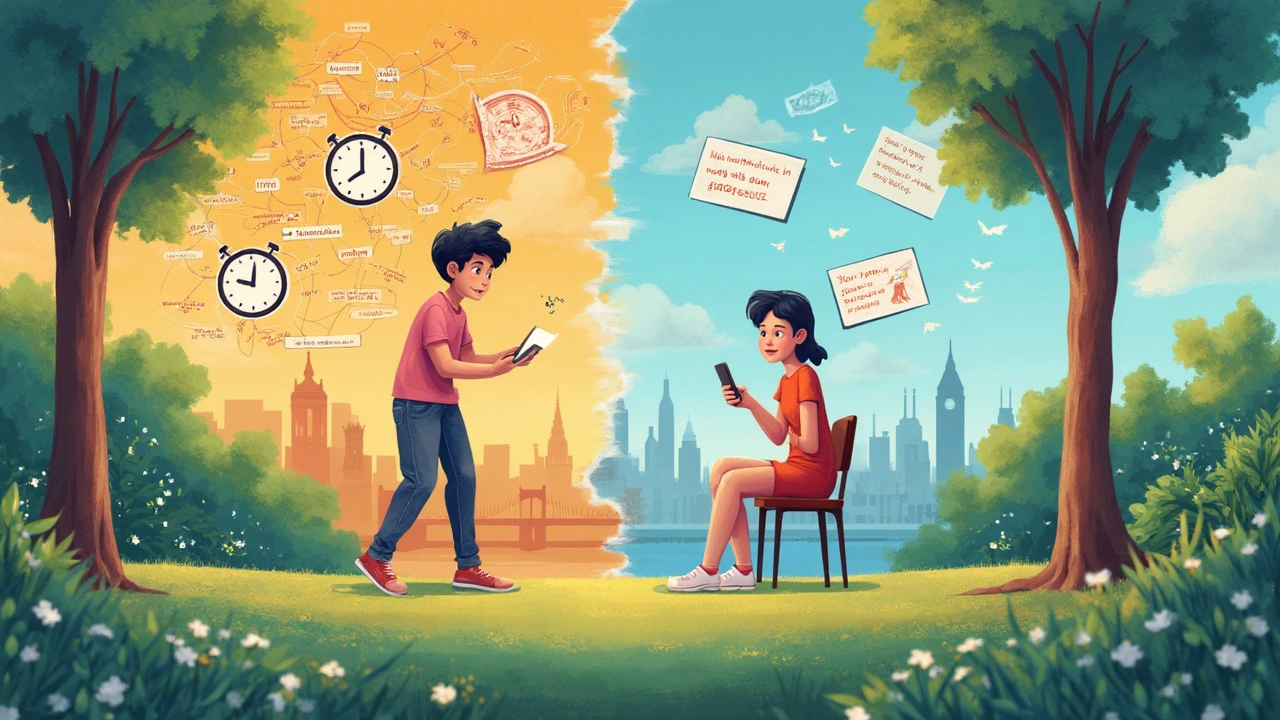If you’ve ever typed “ADHD meds” into a search bar, Strattera probably didn’t pop up first. It’s not the household name that Adderall or Ritalin is. But for tens of thousands wrestling with ADHD, Strattera is a steady game-changer. Why’s that? Because unlike the classics, Strattera isn’t a stimulant. No buzz, no crash, none of the “wired” feeling that scares many people off. Weird, right? A med for ADHD that doesn’t speed you up. People often stumble into Strattera after trying the usual suspects, but once they find it, some wish they’d have started here. Let’s pull apart what makes this med tick, what the hype is, and what you should actually expect if you’re thinking about trying it.
How Strattera Works and What Makes It Different
Strattera’s real name is atomoxetine, but unless you’re reading the fine print on a prescription, everyone just calls it Strattera. The big headline is this: Strattera is the first non-stimulant ADHD treatment that got the FDA’s blessing. It came on the scene in 2002, and since then has flown under the radar while stimulant-based meds hog the spotlight. But don’t brush it off just because it isn’t famous.
Stimulants—stuff like Adderall or Vyvanse—ramp up both dopamine and norepinephrine in your brain. Strattera skips the dopamine focus; instead, it pretty much only boosts norepinephrine, which is another brain chemical linked to attention. This more targeted action means there’s no euphoria, no jitters, and for a chunk of people, no feeling “medicated” at all. And here’s a wild fact: because Strattera isn’t a stimulant, it’s not a controlled substance. You won’t face refill drama, pharmacy headaches, or sideways glances from pharmacists.
What really surprises some people is how different the timing is. Adderall kicks in fast—you might feel it in a half hour. Strattera? Not even close. It can take three to six weeks for the full effect. If you’re impatient (and let’s be honest, isn’t that an ADHD thing?) this lag can be frustrating. But for those wanting slow and steady, Strattera offers predictability, especially since it lasts all day after you reach a steady dose.
Doctors often reach for Strattera when people have a history of substance abuse, heart problems, tics, or anxiety—stuff that gets tricky or risky with stimulants. Kids, teens, and adults all get prescribed it, but it’s not always the first line. Still, studies have shown it can help with focus, organization, impulsivity, and even some of the emotional ups and downs that come with ADHD.
So to recap: non-stimulant, little abuse potential, steady action, and doesn’t mess with sleep or appetite as much as others (though we’ll get to side effects in a bit). That’s a combo hard to find elsewhere. Another overlooked perk? You can take it with or without food—no obsessive planning around breakfast or a meal.
The Real Experience: Side Effects, Dosage, and Tips
Strattera’s no magic bullet, but most people find it manageable. The most common side effects that pop up are an upset stomach, tiredness, drowsiness, and dry mouth. Some folks also notice decreased appetite, dizziness, or mood swings. Nausea’s often at the top of the list, especially in those early weeks. But there’s a pattern: many side effects seem to fade after a couple of weeks. If the first dose knocks you out or makes you woozy, hang in there (with your doctor’s guidance, obviously).
The dosage dance requires patience. You don’t just jump to the full dose; doctors usually start low and climb up. For adults and teens weighing over 70 kg, the target dose hits around 80 mg taken once a day, but it can go higher, up to 100 mg. Kids and lighter adults start lower. Patience is key—rushing can make side effects way worse. Consistency matters too, so aim to take it at the same time every day. Morning usually works best, but some people switch to nighttime if they feel tired during the day.
One more odd thing—Strattera’s best effects often show up after steady, everyday use. Skipping doses can mean a dip in focus or mood that takes a while to rebuild. This isn’t like taking a pain pill for a headache; Strattera works more like an antidepressant, gradually changing brain chemistry. Think of it as a marathon, not a sprint.
Tips? Drink plenty of water—dry mouth can be brutal. If you get nausea, taking the dose with a small snack can make a difference. And if you’re struggling with fatigue, talk to your doctor about shifting the dose to bedtime. Don’t mix Strattera with certain antidepressants, cold medicines, or asthma drugs without checking; drug interactions are real. And while Strattera doesn’t carry the same risk of addiction as stimulants, you shouldn’t stop cold-turkey without a doctor’s go-ahead. Withdrawal isn’t common, but rebound symptoms can feel rough.
And here’s something you might not expect: some people say Strattera helps more than just their focus. It can smooth out mood swings or tension and anxiety. Not everyone sees this, but it’s one reason doc sometimes suggest it if anxiety is tangled up with ADHD.

Who Should Consider Strattera?
Who’s Strattera meant for, really? It’s usually on the shortlist for people who can’t or don’t want to take stimulants. If you have a history of addiction, get bad anxiety on stimulants, or have certain medical conditions like tics, high blood pressure, or heart issues, Strattera’s a solid option.
Kiddos as young as six can take it, and for parents freaked out by horror stories of stimulant abuse or mood swings, Strattera can seem like a relief. It’s not just a backup plan—it’s first choice for a lot of doctors when stimulant risks outweigh benefits. Some adults pick Strattera because it doesn’t mess with appetite or sleep as much, and there’s less social stigma. You won’t get questioned at every pharmacy visit or have trouble traveling with your meds. No need for a special doctor’s note when flying or dealing with school nurses.
For college students, it’s a way to manage focus without the temptation to misuse. For busy parents, it offers steady coverage all day. For people with a history of anxiety or depression, Strattera sometimes doubles as an emotional stabilizer. A 2023 real-world study found many adults who switched from stimulants reported less anxiety and felt “less like a robot” on Strattera. Of course, everyone’s brain is different—some people say Strattera felt like drinking decaf when they wanted espresso. Others say they finally got things done without the stress or emotional rollercoaster of stimulants.
But it’s not for everyone. If you need an instant hit of focus, if you’re impatient to see results, or if you have certain liver or eye problems (like narrow-angle glaucoma), Strattera’s off the table. And while it isn’t linked to weight loss or growth problems to the same extent as stimulants, it still calls for regular doctor check-ins to make sure growth, blood pressure, and mood stay on track, especially in kids.
Prenatal and breastfeeding risks? The evidence is still limited, so if you’re pregnant or thinking about it, bring it up early at appointments. Some people report reduced libido or sexual side effects, so don’t be shy bringing that up with your prescriber. And if you have suicidal thoughts, new or worse depression, or changes in mood, let your healthcare team know fast—rare, but possible, especially in young adults.
Troubleshooting, Success Stories, and Long-Term Use
No ADHD treatment is drama-free, and Strattera’s no exception. The biggest complaint: “It’s not working!” Remember, unlike with stimulants, the magic doesn’t show up overnight. Some people don’t feel any change until week four or even week six—sometimes longer. If weeks go by and your focus still stinks, talk to your doctor. Maybe your dose needs adjusting, maybe Strattera isn’t the match for your wiring. But don’t give up too soon—about half of people who think it’s not working at week two get real benefits by week five.
Something else people mention: if you stop beyond that first month, you might not realize until you find yourself zoning out during meetings or losing track of tasks. That steady, background improvement builds up. And unlike stimulants, there’s no crash when a dose wears off. It’s more like putting on glasses—suddenly you can see the page, and everything feels easier.
Many folks swap stories online about what finally tweaked their routine for best results with Strattera. Common advice? Stick to it, keep a journal of symptoms, side effects, and wins (even tiny wins), and don’t expect the life-changing focus some people get with stimulants. The improvements can be subtle—less “mental clutter,” more consistency, better sleep, fewer arguments at home. That’s real progress, even if it’s not headline-grabbing.
Long-term safety studies keep finding no signs of brain changes, addiction, or dangerous heart effects. But it’s not a set-it-and-forget-it thing—plan on regular appointments to check blood pressure, weight, and emotional health, especially if you’re a kid or teen. Some people stay on Strattera for years, others cycle off and try something new as life changes. If you ever want to stop, doctors recommend tapering off; don’t just stop cold unless a doctor says so.
Want more tips? Here’s a handful straight from people who’ve been there:
- Pair Strattera with a planner app—you’ll see the benefit in steady routines.
- If your kid hates pills, ask your doctor if the capsule can be opened and sprinkled on food (don’t do this without approval).
- If you’re tired at first, try splitting the dose (morning and evening) for a smoother ride.
- Track side effects and improvements. Sometimes what feels like a tiny gain day to day is huge over a month.
- Don’t be discouraged by a rocky first two weeks—the worst side effects often fade.
strattera doesn’t promise superhuman concentration or overnight change, but it does offer a safer, low-drama path to managing ADHD for the right people. If you’re tired of the rollercoaster or don’t fit the “classic” stimulant model, it just might be worth a shot. The key? Patience, tracking your progress, and close teamwork with your doc. With some trial and error, you might find the focus and calm you’ve been searching for—minus the speed—even if you never expected a non-stimulant could do the trick.


Graham Holborn
Hi, I'm Caspian Osterholm, a pharmaceutical expert with a passion for writing about medication and diseases. Through years of experience in the industry, I've developed a comprehensive understanding of various medications and their impact on health. I enjoy researching and sharing my knowledge with others, aiming to inform and educate people on the importance of pharmaceuticals in managing and treating different health conditions. My ultimate goal is to help people make informed decisions about their health and well-being.